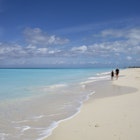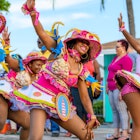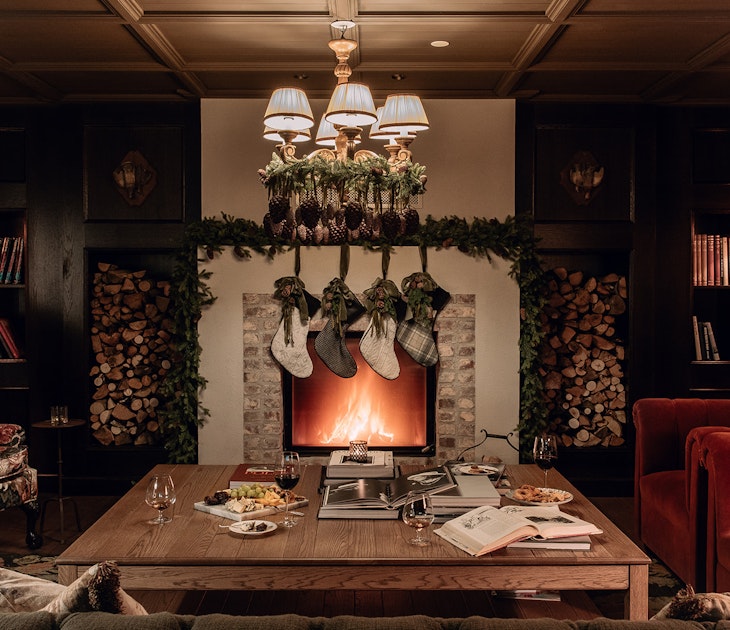
Ultimate Weekend in the Bahamas: Nassau and Cat Island Itinerary

Oct 21, 2024 • 11 min read
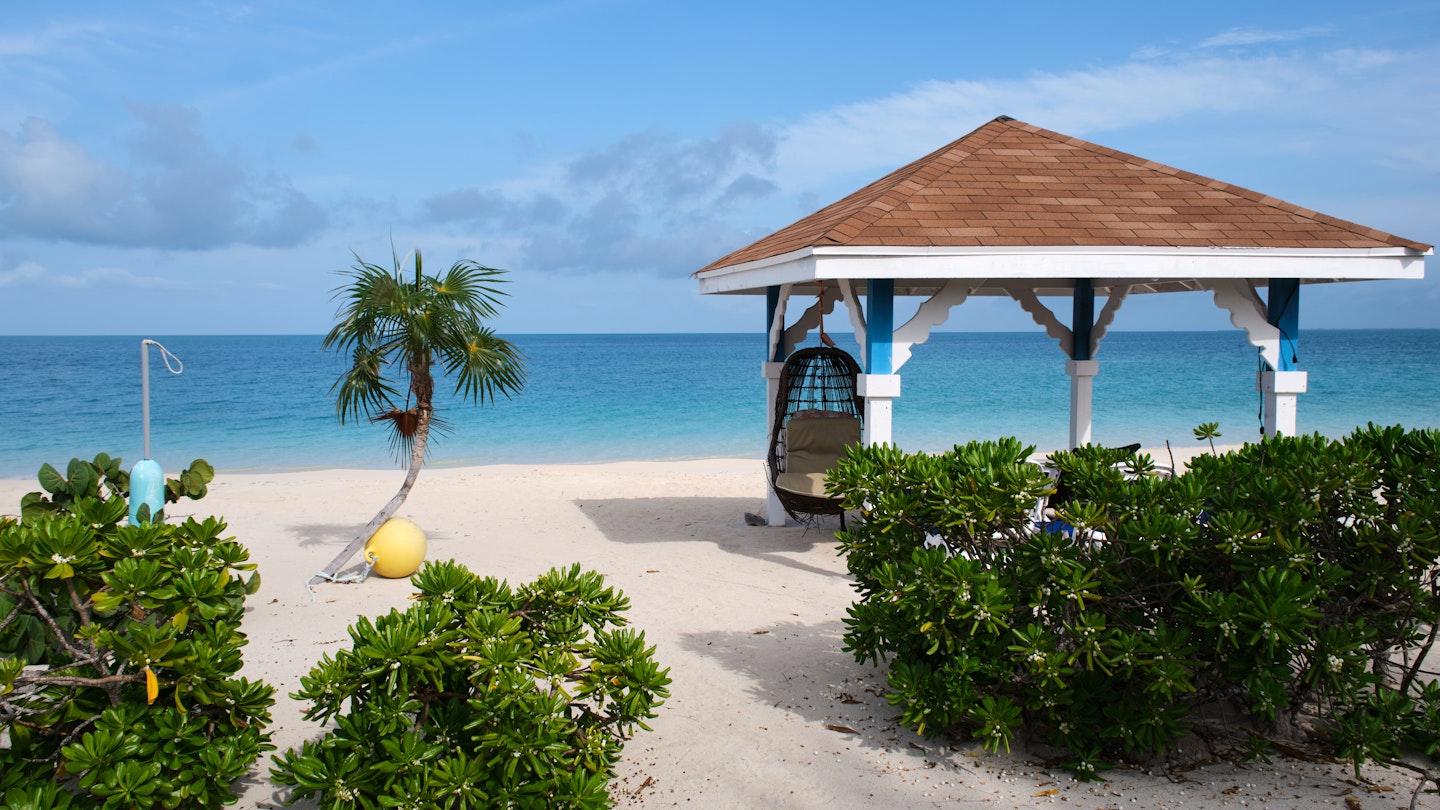
A cabana by the beach on Cat Island. Alexander Howard/Lonely Planet
Few places conjure up images in the mind’s eye quite like the Bahamas. Imagine impossibly blue waters, swaying palm trees and sugar-sand beaches that spill across a horizon painted in watercolor hues, all set to the Junkanoo rhythms of a Goombay drum. The good news? It's possible to find all of this in one weekend; you just have to know where to look.
This Bahamas weekend itinerary balances the historic charm and lively beats of Nassau, this island nation's biggest city, with a lesser-known gem just a 30-minute flight to the east – gorgeous Cat Island. While Nassau offers a taste of Bahamian city life, Cat Island is where those quintessential Bahamian dreams – from secluded beaches to authentic local experiences – truly come to life.
When to arrive: Arrive in Nassau on a Thursday so you have some time to explore the Bahamian capital before heading to Cat Island, which is served by daily flights on Western Air. The best time to visit is from December to April, when the weather is ideal for exploring – warm rather than baking hot, and dry, though it’s also the busiest season, so expect crowds.
How to get around and what to pack: Cars are the primary way to get around in the Bahamas so consider renting a car or using taxis and hotel shuttles. Traffic follows the British system, with left-hand drive vehicles – drive on the left and stay alert if you aren’t used to driving like this. Essentials to pack include sunglasses, reef-safe sunscreen, a swimsuit and water shoes for rocky sections of shoreline.
Where to stay: In Nassau, choose between the luxurious Baha Mar (from $275/night, plus fees), spanning three Grand Hyatt, SLS and Rosewood properties with great beaches and pools, or Atlantis (from $224, plus fees), with seven accommodation options ranging from family-friendly to ultra-luxurious, plus a water park and a marine habitat with aquariums and sealife-filled pools. On Cat Island, Rollezz Beach Villas Resort (from $259) offers private beachside villas, while Greenwood Resort (from $180) is ideal for water babies with diving, snorkeling and kite surfing available right off the beach.

Thursday: Experience Nassau
How to spend the day
Use your first day in the Bahamas to get acclimated to Nassau’s fascinating and complex history. Make your first stop the Fort Fincastle Historic Complex – built in the late 1700s to defend Nassau from pirates. The fort’s location on top of Society Hill and Bennet’s Hill provides a prime vantage point for panoramic views of the city. Be sure to stop by the iconic Queen’s Staircase (aka The 66 Steps) to learn about this leafy historic landmark, carved out of solid limestone by enslaved Africans.
Now about those pirates... The Caribbean’s golden age of piracy ran from the late 1600s to the early 1700s, and Nassau was a "hotbed of pirate activity" according to some historical accounts. Set on a pedestrianized section of George St in downtown Nassau, the Pirates of Nassau Museum offers an informative if somewhat corny look at the islands' pirate history (think lots of tricorn hats and plastic cutlasses).
An arguably more authentic stop is John Watling's Distillery, a historic rum distillery housed in a wonderfully restored 18th-century estate. Named after a 17th-century buccaneer, the distillery offers brief but informative (and free) tours, touching on everything from the islands' pirate history to the complexities of rum making. Kick back in the tasting room for a flight of rum, or sample the delicious house piña colada.

For dinner
Continue the historic vibes with a meal at Graycliff Hotel & Restaurant, housed in a mansion dating back to 1726. The Graycliff’s elegance is palpable – the interior is heavy on dark wood, vintage artwork and Victorian-style furniture, and a scent of tobacco lingers in the air (the Graycliff brand also makes its own cigars).
On the menu, you'll find a fusion of Bahamian and European flavors, with dishes such as truffle ravioli and fresh conch salad as precursors to mains like hog snapper filet and beef tenderloin. Note that there’s a dress code – trousers are required and a jacket is recommended. That said, during my visit, attire was a tad more Margaritaville than Monte Carlo.
After dark
If you still have energy, give one of Nassau's cocktail bars a try. Bon Vivants Cocktail Bar at Sandyport blends craft cocktails with colorful tropical decor.

Friday: Travel to Cat Island
Morning
Start off the day with a stroll along the beach. I stayed at the Grand Hyatt Baha Mar, so I wandered down to the hotel's Cable Beach, festooned with empty lounge chairs. The water was a perfect Caribbean blue, with its surface broken by just a handful of early-bird swimmers. Other options closer to downtown Nassau include Junkanoo Beach, which is livelier and more popular with locals, and Saunders Beach, which is quieter and ideal for a peaceful morning walk.
Get some breakfast
Nesbitt's, about 25 minutes from downtown at Delaporte Point, is a top breakfast joint. Bahamian-flag banners hang from the ceiling and a jukebox stocked with hits from the sixties, seventies and eighties sits in the corner. The furniture is simple but practical – folding tables and aluminum chairs are scattered around the dining area, and the patio offers a view of the sea. Try their red snapper stew – a delicious, creamy, slightly spicy dish with hints of thyme and garlic, served with a side of grits and tangy scotch bonnet sauce.
Catch your flight
Head to the airport to catch your early afternoon flight to Cat Island. There's only one service daily so get there early and listen for boarding announcements; the flight has been known to take off early if all passengers are checked in. You'll be traveling on a small regional jet with limited baggage space, so you'll probably need to check your carry-on bag before boarding. Flight time is around half an hour – book a window seat and you’ll spend all 30 minutes with your nose pressed to the glass looking out at those islands sprinkled across the sea.

Arriving on Cat Island
There are few sea routes to Cat Island aside from a mail boat that takes 12-15 hours to cross from Nassau (an adventure in itself). Planes provide the main connection between Cat Island and the rest of the Bahamas. Arrange pickup with your accommodation, or rent a car from Gilbert’s Car Rental.
Cat Island's main airport (aka New Bight Airport) is a charming, single-runway affair with a small terminal building housing a single ticketing desk, a security check and bathrooms (departing passengers wait underneath a canopy outside the terminal building). You might have to wait a bit for your luggage, so linger around the parking lot and observe the lively sense of community here.
Use the afternoon to explore the beaches
Cat Island is a long strip of land shaped like a fishhook, with its eye pointing northwest, and hitting the beaches is the best way to settle in on arrival. Typically beaches on the eastern shore, facing the Atlantic, are more exposed to the elements, with moderate waves depending on the weather. On the west side, the beaches are usually calmer.
The beach at Rollezz Villas Beach Resort is one of the best, a west-facing strip of powdery sand that’s primed for gorgeous sunsets. On the east side of the island, Greenwood Beach Resort is one of the Bahamas' pink-sand beaches (it’s a gentle hue, but pinkish nonetheless). Dine at your hotel and set an alarm so you can be up bright and early on Saturday to explore.
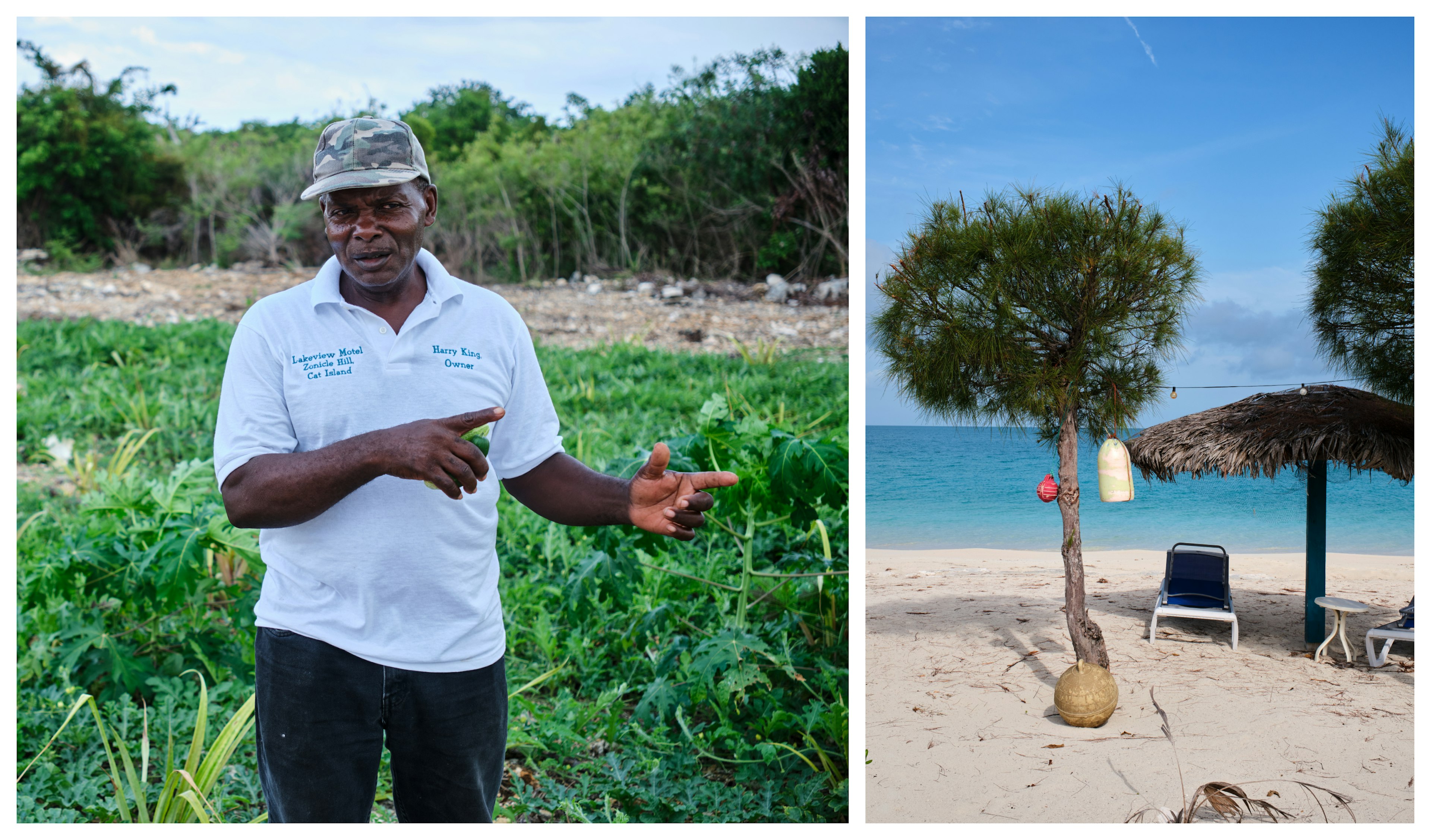
Saturday: Explore Cat Island
Morning
Time to take in Cat Island's main sights. First, head to the Healing Pond for a refreshing dip; this natural pool has a high mineral content and salinity, and it's believed that a dunk here will cure all sorts of aches and pains. The story goes that locals discovered the water's healing properties after bathing their workhorses – following a soak, the horses came out refreshed and ready to work. Whatever's going on here, the Healing Pond is a pleasing place to bathe – the high salt content will keep you afloat, and the water has a nice, silky quality. Bring water shoes as the shore of the pool is rocky and sharp.
For lunch
Be sure to visit Lakeview Motel & Restaurant on the south side of the island. Owned and operated by local legend Harrison King, the restaurant serves Bahamian favorites such as conch fritters, fried mahi-mahi, pumpkin, cassava and fresh salad. On Cat Island, local residents wear many hats, and Harrison King has been a school bus driver, police officer, local farmer and motel owner at various times.
If he's around, he'll entertain you with stories of life on the island, and anecdotes about getting lost while land crab hunting, or what it's like to wear a badge on one of the Bahamas's most laid-back islands. Ask and he'll show you around one of his nearby farms, and share insights into the tough but rewarding work of local farmers on Cat Island. That watermelon for dessert? It was likely plucked straight from one of Harrison King's plots.
In the afternoon
Once sated, set your sights on Mt Alvernia, the Bahamas's highest point at 206ft. Although a modest hummock by mountain standards, the site holds outsized historical significance. Atop the hand-carved steps to the mountain's peak sits the Hermitage, a tiny monastery built by the architect-hermit Father Jerome in the 1940s. The monastery's stone walls add historical weight to the bushy hilltop, and the view is one of the best on the island, taking in 360 degrees of shoreline.
For a while, Cat Island was thought to be Guanahani, the Lucayan name for the island where Christopher Columbus first made landfall in 1492. Today, most historians believe Guanahani was actually the island of San Salvador to the east, but many locals still insist Cat Island was the spot.
Whichever island Columbus reached first, the arrival of the Spanish had a huge impact on the Caribbean, and the world. Over the ensuing decades, Spanish forces eradicated the Indigenous Lucayan population through genocide and enslavement, and the Caribbean became the nexus of the Atlantic Slave Trade.
Prior to emancipation in 1834, there were as many as 50 plantations on tiny Cat Island (an island of a little more than 150 square miles). Twenty of these have been identified, including the ruined but still recognizable Deveaux Plantation, an 18th-century cotton plantation that was home to Colonel Andrew Deveaux.
The colonel was gifted this plot of land by the British after helping to protect Nassau from the Spanish in 1783. Today, just the walls and a few ceiling beams are standing in the main house, and the exterior stucco is cracked and weathered. In the cookhouse behind, a huge tree emerges through the open ceiling, as if reclaiming the land from this dark period in Bahamian history.

Dinner and drinks
Nightlife on Cat Island is typically a staid affair, but if you're lucky you might catch an authentic rake and scrape session. Traditionally played with a goatskin drum and a carpenter's saw and screwdriver, rake and scrape is the quintessential folk music of the Bahamas.
Thought to have originated in Turks & Caicos, this informal dance music was created by the descendants of enslaved Africans, who used everyday objects as instruments. Today, you're likely to hear an accordion or guitar as part of the accompaniment, but the rhythmic scraping of the saw is the style's hallmark.
On Cat Island, local bars such as Yardie's in New Bight or Hidden Treasures in Arthur's Town occasionally host enthusiastic rake-and-scrape nights. Don't be shy – rake and scrape is participatory, and you might be asked to join in and learn a step or two (even yours truly was able to pick up the simple heel-toe movement of the "conch step"). The island's annual Rake & Scrape Festival happens in May or June.
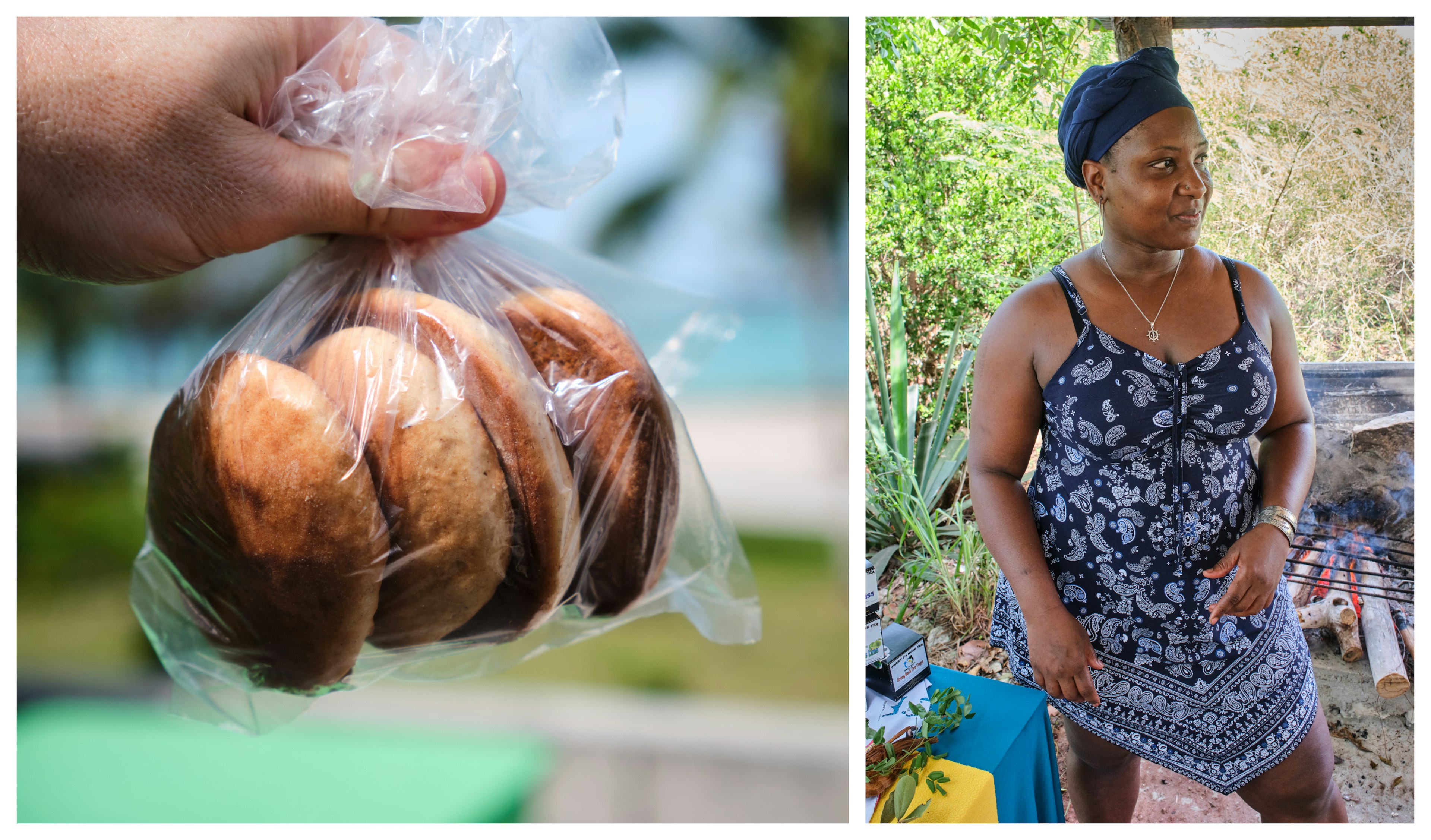
Sunday: A last taste of Cat Island
Morning:
Before catching your noon flight out of Cat Island, swing by Olive's Bakery in New Bight for guava bread, a sweet treat common across the tropics, made from chopped guava, flour, brown sugar, cinnamon and vanilla.
For a parting glimpse of the island’s intriguing culture, be sure to stop at Sweet P’s Bush Teas (call ahead to confirm they're open). Here, local herbalist Peggy Johnson concocts natural teas using herbs, spices, flower petals and leaves found on the island.
Peggy will show you how she makes everything, from specialty teas such as "soursop" (a cure-all tonic, said to boost immunity, aid digestion and stabilize blood pressure) to boutique soaps. This isn’t your grandmother’s chamomile – according to Peggy, several of her elixirs actually have the power to enhance longevity.
By the time you leave, you'll be eyeing every leaf and petal in sight, wondering about their hidden powers, but resist the urge to brew your own backyard blend – leave the magic to Peggy and her years of experience!
Leaving the Bahamas
As I boarded my flight home from Cat Island, the flavors of guava bread and bush teas still lingered. Beginning the slow, lumbering journey that is modern air travel back to the US, I pondered the richness of my experiences in the Bahamas.
Everything I’d pictured before arrival was there – pristine waters just outside my door at Rollezz Villas Beach Resort, plenty of palm trees, more beautiful sunsets than I would see in a month back home – but there was more.
I discovered a complicated colonial history in the decaying plantations that dot the island, a rich musical tradition in an upbeat rake and scrape jam session, and some damn good food. And I barely scratched the surface – there are still 700 more islands and cays to explore. I'll be back for sure...
Explore related stories


 BeachesChristmas in the Caribbean: 5 places to make the holiday unforgettable
BeachesChristmas in the Caribbean: 5 places to make the holiday unforgettableNov 11, 2024 • 3 min read


